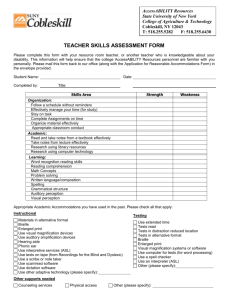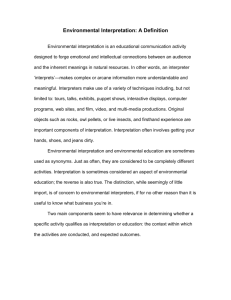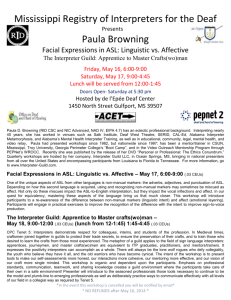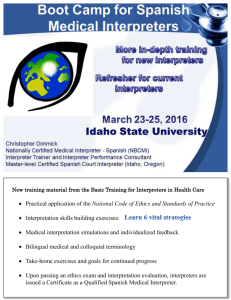Reasonable Accommodations for Deaf and HH Students, R5
advertisement
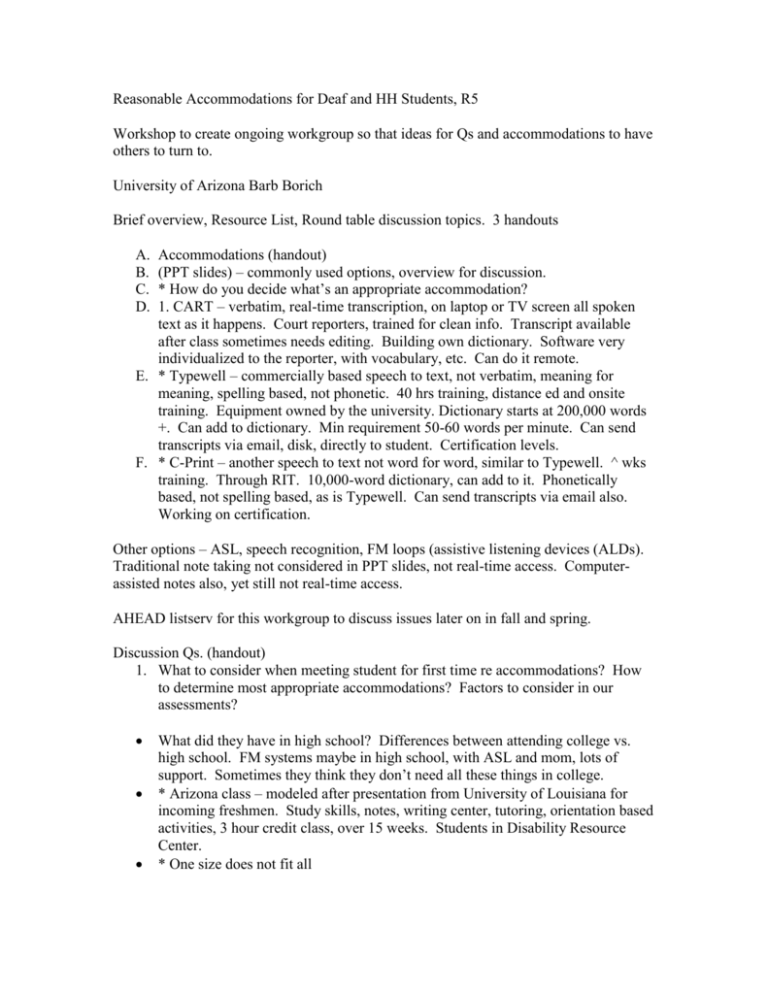
Reasonable Accommodations for Deaf and HH Students, R5 Workshop to create ongoing workgroup so that ideas for Qs and accommodations to have others to turn to. University of Arizona Barb Borich Brief overview, Resource List, Round table discussion topics. 3 handouts A. B. C. D. Accommodations (handout) (PPT slides) – commonly used options, overview for discussion. * How do you decide what’s an appropriate accommodation? 1. CART – verbatim, real-time transcription, on laptop or TV screen all spoken text as it happens. Court reporters, trained for clean info. Transcript available after class sometimes needs editing. Building own dictionary. Software very individualized to the reporter, with vocabulary, etc. Can do it remote. E. * Typewell – commercially based speech to text, not verbatim, meaning for meaning, spelling based, not phonetic. 40 hrs training, distance ed and onsite training. Equipment owned by the university. Dictionary starts at 200,000 words +. Can add to dictionary. Min requirement 50-60 words per minute. Can send transcripts via email, disk, directly to student. Certification levels. F. * C-Print – another speech to text not word for word, similar to Typewell. ^ wks training. Through RIT. 10,000-word dictionary, can add to it. Phonetically based, not spelling based, as is Typewell. Can send transcripts via email also. Working on certification. Other options – ASL, speech recognition, FM loops (assistive listening devices (ALDs). Traditional note taking not considered in PPT slides, not real-time access. Computerassisted notes also, yet still not real-time access. AHEAD listserv for this workgroup to discuss issues later on in fall and spring. Discussion Qs. (handout) 1. What to consider when meeting student for first time re accommodations? How to determine most appropriate accommodations? Factors to consider in our assessments? What did they have in high school? Differences between attending college vs. high school. FM systems maybe in high school, with ASL and mom, lots of support. Sometimes they think they don’t need all these things in college. * Arizona class – modeled after presentation from University of Louisiana for incoming freshmen. Study skills, notes, writing center, tutoring, orientation based activities, 3 hour credit class, over 15 weeks. Students in Disability Resource Center. * One size does not fit all * Student preference vs. your sense there may be better option. Ex student doesn’t know ASL, operated in K12 orally – maybe Typewell or real-time captioning. Student hated having captioners following her around, didn’t want to be identified as disabled in any way. They were certain she’d have hard time with mere lip reading; she needed to grapple with identity. Also, 15 pages of CART transcripts may take longer to digest than a meaning-for-meaning Cprint or Typewell transcript. * Audience member – they use laptops in classes, less of an issue for being singled out as different, since most others use them in class too – easier to blend in. * CART has to sit next to student, equipment hooked together. Typewell and Cprint can be wireless, not necessarily next to student – allows flexibility in positioning. Screen goes in front of class; everyone can read captioning, not singled out for just disabled student. * Audience member – used herself as example (deaf) – much less services then. I know now in my job, what’s required for qualified note takers, volunteers could be lousy. Need to ask deaf student preferences, to see what he/she would benefit from – maybe both note taker and Typewell options, maybe ASL and professional note taker. * Audience member – they use complementary services for student who needs ASL but doesn’t voice – note taker and ASL to vocalize for student. * Audience member – uses teams, group discussions may not be appropr for captioning. Cross-trained professionals. * One accommodation may mot be best for a specific class (CART in lab) – may require you to visit the class, talk to the professor, and find out what’s going on. * Today’s services – not same as Typewell – less certified. * Alphasmart – son has it, connected to computer to download. Alphas in labs, noisy areas – tech person made shelf for alphasmart around person’s neck in the lab, to freely move around. Infrared to each other. Q2. Importance of collaborating with students case-by-case vs. categorical approach: How to make decisions? What if they ask for one accommodation and we think another is better? Better to go individualized basis. Some deaf students have LD, etc – depends on individual needs. * For tiny budgets – must contract with interpreters, maybe 1st 6 wks and another interpreters for last 8 wks, etc. Frustrating for our students that we don’t have a staff interpreters to go to a meeting without notice, advisors, other class meetings with peers, etc. A lot of faculty use AOL instant mess, use existing technology to communicate with students – getting faculty to realize oh, this is something I’d use anyway. * Issues above are two – being able to find interpreters, and budget issues. Mandated accommodations – can’t let budget issues dominate al that we do * Sometimes you pay much more money in contractual services than you would if you paid for staff interpreters. * Budgets – Important topic – continue to challenge ways your office is financially supported. Required by law to provide the accommodation – don’t let money short-changing students. * Student preferences for specific interpreters? May not be trained in postsecondary. Explain what our interpreters are able to do. Discuss your core group of trained interpreters. Flip side – sometimes interpreters is best match for the student, depending on needs. 2nd ex – staff of 7 certified terps, student preferred interpreters who wasn’t certified, they provided the one the student preferred. * Budget issue – partnership with voc rehab works for his school, to split costs for CART and ASL. Administration understood how important the issues are for the office. But different states have different levels of voc rehab interagency agreements. Arizona has unique situation. Federal funding for states differs from state to state. Still the institutions’ responsibility to provide the services, whether public or private, regardless of whether there is any interagency agreements to assist in costs. In Texas, waivers for D/HH in tuition, and TX Commission for Blind – waivers for tuition. Our rehab program only pays for books, and ½ cost of ASL and CART, etc, as well as dorms, and other auxiliary aids. We share cost between TRC and University. Also we have to be careful with our wording – accessibility provide, but not because our money is limited – that’s discrimination. You can’t base accessibility on money alone. I try to tell my administration over and over about this. We need to be careful about our budgets, and out states haven’t planned for these costs, but the services must be provided. Q3. Discussion re: HMO model (cheapest accommodation, try that and if it doesn’t work, try something else, if that doesn’t work, then try CART). gut may tell you student needs something more appropriate to their needs, but don’t’ get caught up in choosing least expensive accommodations by only considering cost and not communication access. * Audience member – we go down the list – what they want vs. what’s available vs. what we’d like to accommodate. Accommodations provided based on what’s available, with limited resources. * PepNET resource * Availability – in Canada, BC – travel far to get to school by boat or plane. Colleges have felt obliged to fly interpreters in for the day and fly them back. What’s the reasonableness and alternatives for places where it’s not a budget issue, but a people issue. Remote and lack of availability – in Georgia same problem, flying terps in. Working on remote interpreting, not up to speed yet. For captioning, in Georgia – you can’t deny simply due to not finding a captionist – try t find a remote company. One in Georgia, another in Maryland, another in California. Remote interpreting, not yet. * Provinces in Guam, etc – training has been done to address their needs also. * Can community and workforce development in your area coordinate training for C-Print, etc captionists? * Distance education ACL classes may also work for you * OCR letter to San Diego CC college district -= issue of building capacity –said sorry, we ran out of resources. In long period, this doesn’t work with OCR. Time ran out. Yellow pad – sign to participate in workgroup online. Contact presenters to join listserv. For more info – Barb Borich, University of Arizona; Tony Moy, San Francisco State Univ.

![See our handout on Classroom Access Personnel [doc]](http://s3.studylib.net/store/data/007033314_1-354ad15753436b5c05a8b4105c194a96-300x300.png)
